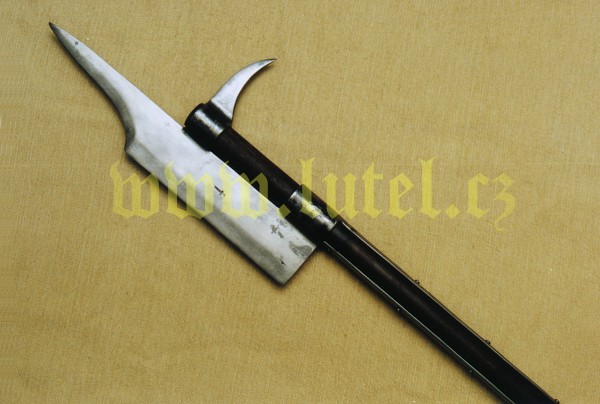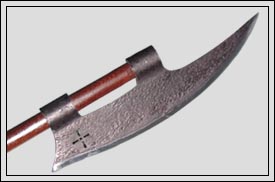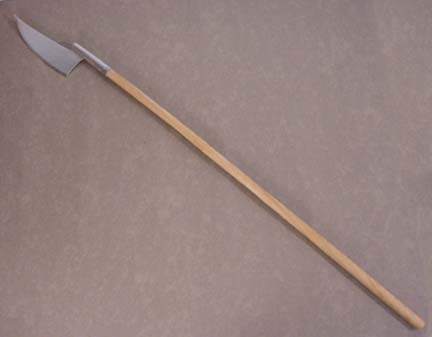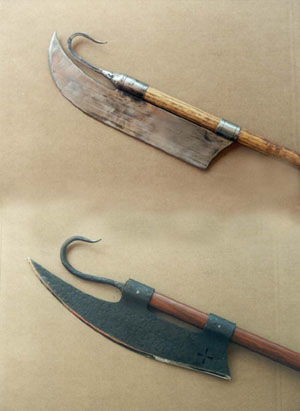Posts: 1,191 Location: San Francisco, CA
Wed 07 Apr, 2004 6:05 pm
Staff weapons in the XIII and XIV century
Howdy folks,
I have spent the last few days trying to find information and pictures of actual poles weapons from the xiii and xiv century. For the purposes of this post I want to neglect spears and lances, and concentrate on weapons that can both cut/chop and thrust (halberds).
Oakeshott mentions that in the battles of Flanders (1302) and Morgarten (1315) in Switzerland Halberds were used with great success. What did these weapons look like?
Oakeshott has an illustration of a halberds looking like the first picture bellow were used early in the xiv century (this particular specimen was dated to XVc)
The only other picture found was to a XIVc "glaive?". There are plenty of examples of XVc and later halberds but I am not interested in those .
Where there any other varieties during this time period? Who used them? Could they be considered knightly weapons as well or not? Knights in the Maciejowski bible were pictures with similar weapons were they not?
My last question might be the hardest to answer. When fighting on foot, what was the preferred knightly weapon apart from the sword? I am mostly interested in two handed weapons. This question still has the XIII-XIVc period in mind.
Looking forward to any comments,
Alexi
 Attachment: 49.02 KB
Attachment: 49.02 KB
Halberd from Czerny's. Dated XVc [ Download ]
 Attachment: 23.5 KB
Attachment: 23.5 KB
Czerny's XIVc halberd (glaive?) [ Download ]
Last edited by Alexi Goranov on Sat 10 Apr, 2004 9:34 pm; edited 2 times in total
Posts: 112 Location: Green Bay WI
Wed 07 Apr, 2004 6:17 pm
The "signature weapon" of the English was the bill. It is derived from the agricultural billhook and is variously called "English bill" or "brown bill." A google search should yield images. Arms & Armor sells an excellent repro:
http://armor.com/2000/catalog/item030.html
A&A also offers an Italian bill. Other useful search terms include partizan and berdiche. Variant spellings abound.
JSA
Posts: 1,191 Location: San Francisco, CA
Wed 07 Apr, 2004 6:28 pm
| James Aldrich wrote: |
The "signature weapon" of the English was the bill. It is derived from the agricultural billhook and is variously called "English bill" or "brown bill." A google search should yield images. Arms & Armor sells an excellent repro:
http://armor.com/2000/catalog/item030.html
A&A also offers an Italian bill. Other useful search terms include partizan and berdiche. Variant spellings abound.
JSA |
Thanks James.
I have gone over the A&A catalogue many, many times. You are right that the english bill is being used from the 14-17c, the particular example (the original) is listed circa 1490. This falls beyond my area of interest. Now if the english bills from the XIV c looked the same, then we are in business.
How about the pole axe, were there XIII-XIVc examples of these?
Posts: 1,717 Location: Buffalo, NY.
Thu 08 Apr, 2004 1:16 pm
I share an interest in this area, though I go further back in time to 1100-1300.
Oakeshott goes into this issue of the early pole arm a little in "the Knight and His Weapons." He states that the earliest times pole arms were really just bill hooks on long shafts (without a thrusting point). So during my era of interest I wont even be looking at a thrusting weapon, but for you it seems to me (just thinking here as Oakeshott does not say this) that you would take a simple bill hook and put a long point at the top. The A&A piece, though nice, is to stylized and developed for your time period. A custom may be in order, when I get a early pole arm I will have A&A make it for me. A&A does great non-sword items. Hope that's helpful.
Posts: 394 Location: Fresno, CA
Thu 08 Apr, 2004 8:48 pm
"When fighting on foot, what was the preferred knightly weapon apart from the sword? I am mostly interested in two handed weapons. This question still has the XIII-XIVc period in mind"
I am not sure there is an answer to this question, if you exclude spears and lances. The
shield remained in general use throughout the 13th century, as far as I know, and that interferes with using a two-handed weapon. Knights could fight dismounted in the 13th century, but it was less common than before or afterwards, so the issue of preferred weapon didn't come up that often.
The early polearms tended to start as modifications of agricultural implements, such as the bill and the flail. Knights by definition didn't use these tools nearly as much as commoners. The commoners knew how to use them, and could afford to own them (as opposed to knightly kit). There was some degree of social snobbery, I suspect, as well. A knight showing up with a farmer's tool in hand might take a lot of rude comments. The only polearm which really caught on with the upper classes was the pollaxe.
K+K has a pretty fair reproduction of a 14th century halberd:
http://www.armouronline.com/home/products/sta...aff_weapon
Posts: 112 Location: Green Bay WI
Fri 09 Apr, 2004 10:04 am
I begin to appreciate the difficulty of this inquiry. My meager library yields few illustrations of actual polearms earlier than c15. George Cameron Stone [A glossary of the Construction, Decoration and Use of Arms and Armor. . .] provides a picture of one berdiche attributed to c14-15.
He also says of the Glaive or Couse: A broad-bladed polearm in which the edge curves backward near the point, 12th and 13th centuries. Alas, no photos.
JSA
Posts: 5,981 Location: Birmingham, Alabama
Fri 09 Apr, 2004 10:14 am
Last edited by Sean Flynt on Fri 09 Apr, 2004 1:19 pm; edited 1 time in total
Posts: 5,981 Location: Birmingham, Alabama
Fri 09 Apr, 2004 1:10 pm
Posts: 1,191 Location: San Francisco, CA
Fri 09 Apr, 2004 1:44 pm
| Sean Flynt wrote: |
This seems like it would be a helpful reference for you: http://www.geocities.com/wolfram_von_taus/Research_Voulge.htm
Have you seen the Windlass voulge (below)? Again, this may be just a bit late for your interests. I handled one of these and was very impressed by its construction, weight and handling (plus, I just love the design). They're relatively inexpensive-around $160-but I don't know if the dates shown below are accurate. Windlass/MRL sometimes get dates wrong. Have you checked out Lutel's offerings (lutel.cz)? I think they have an early halberd. |
Thanks Sean,
The voulge reference was pretty neat and provided a picture of the XIVc swiss weapon. I did look into Lutel's weapons, and the only ones falling in to the time period of interest were few battle axes, but no halberds. One is listed as early XVc halberd and looks almost exactly as the XIVc voulge. Might be an alternative. There are also several nice illustrations (by grahm turner) in the Osperey's "English medieval knight" (either 1300-1400 or 1200-1300) book showing a glaive like weapon used against mounted knights.
The Albion Kern pole axe looks astonishingly simple and deadly and I would buy it in a heart beat if I knew that a very similar weapons had been used before XV c.
Thanks to anyone who responded so far,
Alexi
 Attachment: 14.87 KB
Attachment: 14.87 KB

XIVc swiss voulge
 Attachment: 60.33 KB
Attachment: 60.33 KB

Lutel early XVc halberd
Last edited by Alexi Goranov on Fri 09 Apr, 2004 2:07 pm; edited 1 time in total
Posts: 634 Location: UK
Fri 09 Apr, 2004 1:48 pm
That lower one of the Mad Piper versions looks ever so much like a Hanwei GT 1076 (attached) with a hook welded on.
 Attachment: 13.03 KB
Attachment: 13.03 KB

Posts: 1,191 Location: San Francisco, CA
Fri 09 Apr, 2004 2:05 pm
| Geoff Wood wrote: |
| That lower one of the Mad Piper versions looks ever so much like a Hanwei GT 1076 (attached) with a hook welded on. |
This Hanwei or Mad Piper peice looks nice. No date though. Any opinion about the quallity of the Hanwei pole arms?
Alexi
Posts: 5,981 Location: Birmingham, Alabama
Fri 09 Apr, 2004 2:08 pm
Well, if you like that Kern axe, I bet you'd really get a kick out of that Windlass Swiss Axe (see my edited post). Same general idea as the Kern axe, but it's just inside the period of your interest, and is slightly more sophisticated (back spike, langets and butt spike). That butt spike is not to overlooked, by the way. It is substantial and solid, and dramatically expands the capability of the weapon. I loved the way this weapon handled. Very quick, and with a nasty bite at both ends. It was enlightening and a bit nervewracking to see two of my ARMA colleagues VERY gingerly sparring with this weapon and the voulge. Those back spikes are very effective at trapping, pulling, hooking, tripping, etc. Certainly made me think that I'd choose one of these over any sword. If you're interested in either of these Windlass weapons, I have photos of them in action. That would give you a better sense of scale than the catalog photos can provide. Just holler if you want to see them and I'll post them here.
Posts: 1,191 Location: San Francisco, CA
Fri 09 Apr, 2004 2:31 pm
| Sean Flynt wrote: |
| Certainly made me think that I'd choose one of these over any sword. |
You got to the heart of my idea behind this post. I think when fighting on foot against well armoured and/or mounted foes, these pole weapons may be more effective then a sword. So Sean, like I asked Geoff, any comments on the quality of MRL pole weapons. The shaft is what worries me the most.
It will be really informative to hear from someone who has held the MRL/Hanwei products and authentic weapons. Then we will have a point for comparison. But that might be too much to hope for.
Alexi
Posts: 5,981 Location: Birmingham, Alabama
Fri 09 Apr, 2004 4:46 pm
I found both of the Windlass/MRL weapons referenced here to be of the same quality as the best swords i've gotten from this source. That is to say, they were solid, well-finished, tightly and solidly assembled and of very comfortable weight and balance. Not fancy, but very functional. I wouldn't hesitate to buy either one, and probably will buy the Voulge at some point. The Voulge is reportedly a copy of a weapon once owned by MRL founder Hank Rheinhardt (I've probably butchered the man's name) and now in a Tennessee collection. That's a significant bit of information, since one can reasonably assume that the replica is informed by virtually unlimited examination of the original. I read over at SFI that somebody broke a haft on their Voulge, but I got the impression that this may have been due to some defect in the wood rather than shoddy craftsmanship (apart from wood selection, I mean). Both have nice looking and feeling hafts, but the Voulge haft struck me as the more elegant of the two because it tapers from the base up to the head. My overall impression is that the haft of the Swiss Axe was the more robust of the two. If I remember correcty, the Voulge does not have a butt spike or any banding to prevent splitting-just something to consider if you plan to be standing around holding the weapon with the butt on the ground.
Posts: 394 Location: Fresno, CA
Fri 09 Apr, 2004 7:52 pm
Of the reproduction designs posted so far, the Hanwei GT 1076 looks the most like a very early halberd. A blade similar to that one was recovered from the field of Mortgarten - which was fought in 1315. The two-part socket is a distinctive part of early halberds, as it helps to keep the head from breaking off the shaft. The design of the kern axe is less sturdy in this feature.
The Lutel design and the K+K one I mentioned above are the next stage in halberd evolution, and date from the late 1300's.
Posts: 634 Location: UK
Sat 10 Apr, 2004 3:07 am
| Alexi Goranov wrote: |
| Geoff Wood wrote: | | That lower one of the Mad Piper versions looks ever so much like a Hanwei GT 1076 (attached) with a hook welded on. |
This Hanwei or Mad Piper peice looks nice. No date though. Any opinion about the quallity of the Hanwei pole arms?
Alexi |
Alexi
The GT pieces are generally solidly made, if a bit on the heavy side. I've not got this one, but I recall suggestions to that effect from previous Netsword discussions. I've got a shorter axe from them that I like a lot, but again it might be bit 'overmade'.
Geoff
Posts: 4,194 Location: Northern VA,USA
Sat 10 Apr, 2004 7:39 am
That Hanwei polearm is solid, but ridiculously heavy. It's really thick steel, and while it looks pretty good, it isn't really a functional weapon, in my opinion, because of the weight.
I own a Hanwei spear which is pretty decent for the money, though the head is still too heavy. There's something about the shaft that I can't put my finger on, but it somehow just doesn't feel as sturdy as it could. But that could be my imagination. I haven't done anything heavy enough to really test it, either.
I also own the MRL bec de corbin. That's a pretty good handling polearm for the price. The wood haft is nice and thick, and while the construction is very simple, it isn't ugly. The really bad thing about it is that the langets are held in with flat head screws. Why they couldn't just use nails is beyond me.
But now that I say that the haft is nice and thick, I should point out that I've heard of two MRL shafts breaking pretty badly. One was the voulge that probably is the same instance that Sean mentioned (I think it was Jamie Blacksmiths?), and the other was a recent one on SFI with a warhammer. The warhammer I've seen up close, and it uses the same wood as my bec de corbin, and it's the same thickness. The split was pretty bad. So, as always with lower end stuff, cross your fingers when you purchase, and be careful when you've gotten it in hand.
Posts: 285
Sat 10 Apr, 2004 9:25 am
We have split the shaft of an A&A bec de corbin too, so I don't think this is an issue of quality but more an inherent risk of wooden shafts, particularly if they are pinned through langets. That line of holes, especially when running in line with the grain, makes for a natural, linear, weak link. I have MRL's French Voulge, and Tower of London Lochaber Axe(really a bardiche) and find them very solid. I've also played with the German Voulge and it handles like a dream.
Posts: 285
Sat 10 Apr, 2004 9:34 am
I think the English bill as well as most glaives and fauchards fit this era. I have seen a number of contemporary illustrations(though I can't remember where) showing full length glaives and fauchards as well as shortened, sword length versions. I also recall classic brown bill heads with slightly shorter top spikes mounted and used on single hand grips as pruning bills. A&A's English bill is one of my favorite polearm repros being very light and handy with cutting edge to spare. The MRL version was equally responsive but with a little less edge and is no longer available.
Posts: 1,422 Location: Minneapolis, MN, USA
Sat 10 Apr, 2004 9:57 am
Some examples
Hello Alexi
Here are some examples I have found. My best polearms sources are not at hand, but I will try to add to it in a few days when I can get at them.
[ Linked Image ]
Regards
Craig
You
cannot post new topics in this forum
You
cannot reply to topics in this forum
You
cannot edit your posts in this forum
You
cannot delete your posts in this forum
You
cannot vote in polls in this forum
You
cannot attach files in this forum
You
can download files in this forum






